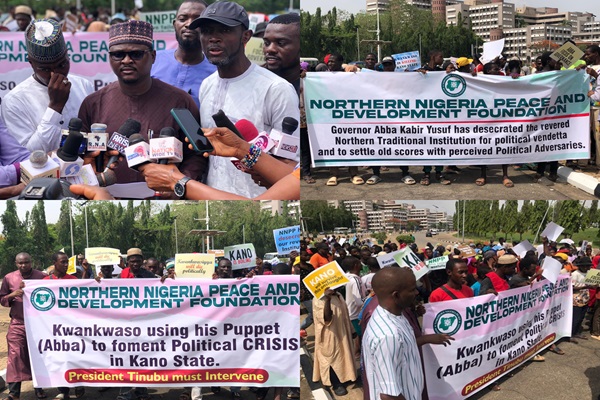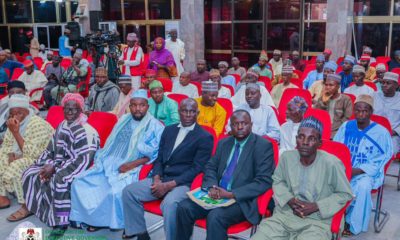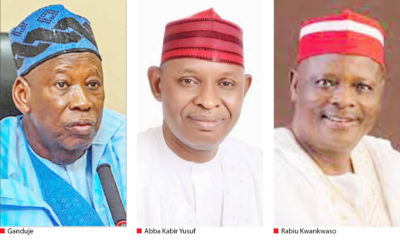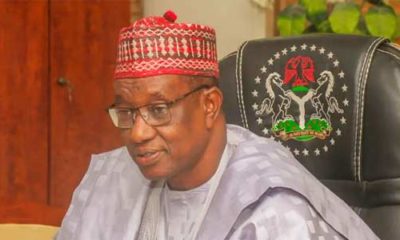NEWS
JUST IN: Sanusi’s Triumphant Return To Kano, Greeted With Massive Protests In Abuja

As widely speculated, Kano State Governor, Abba Yusuf, on Friday presented Alhaji Sanusi Lamido Sanusi with a letter appointing him as the Emir of Kano.
However, as the event was happening in Kano, protesters stormed the Presidential Villa and the National Assembly Abuja, calling on President Bola Tinubu to intervene in the ongoing crisis over Kano Emirate.
Biztellers reports that following legislative actions, by the Kano State House of Assembly, including a repeal of an existing law and a resolution, Sanusi moved into Abuja on Thursday with royal paraphernalia.
All that was preceded with an executive endorsement of all the legislative actions which culminated in the presentation of the appointment letter on Friday.
Gov had given the five Emirs who became automatically deposed by the action of the government of Kano State a 48-hour ultimatum to hand over the State’s Commissioner of Local Government Affairs.
However, a Federal High Court, sitting in Kano had ordered that the process be put on hold pending the determination of a fundamental human rights action filed by Alh Aminu Babba Dan Agundi, the Sarkin Dawaki Babba of the Kano Emirate.
Justice Mohammed Liman who issued the order also slated 3rd of June, 2024 for the hearing of the matter.
But it appears that the political actors in Kano State are either not in the know, not been served or would have none of that as they have gone with presenting Sanusi with a letter of appointment, reinstating him as the Emir of Kano.
Gov Yusuf said, “By the powers conferred on me by the Kano Emirate Council Law of 1984 and 2024, and supported by the recommendation of the kingmakers, I have the singular pleasure to confirm the reappointment of Muhammadu Sanusi II as the Emir of Kano and the head of the Kano Emirate Council.”
Sanusi’s reinstatement took place at the Government House in Kano, four years after he was deposed by the immediate past governor of the state Abdullahi Ganduje.
At the event, the governor reechoed the Emir’s role and urged him to lead according to Islamic tenets of Islam.
“As the Emir is being appointed for the second time, it is based on his competence, credibility, and popularity,” he said.
“I urge him to be guided by the principles of Islamic teachings and to use his position to unite the emirate, fostering harmony among the Islamic sects in the state.”
Traditional rulers, kingmakers, and other top dignitaries were in attendance at the event which came barely one day after Governor Yusuf signed the Kano State Emirate Council (Repeal) Bill 2024 into law.
The new law replaces the Kano State Emirates Council Law, 2019, and dissolves the emirate councils created by Ganduje.
That law was used by Ganduje to split the Kano Emirate into five in December 2019 and deposed Sanusi II, on March 9, 2020.
The emirates created by the Ganduje administration were Karaye, Bichi, Rano, and Gaya, in addition to Kano.
Emir Sanusi II, had ascended the throne during the former President Goodluck Jonathan administration after being ousted from office as governor of the Central Bank of Nigeria (CBN).
Protesters Storm Abuja
While Kano was busy enthroning Emir Sanusi II for the second time, massive protests erupted in the Federal Capital Territory (FCT), Abuja against his return to office.
The peaceful protesters marched with banners to register disagreement with and express concerns about the situation in Kano.
According to the protesters, it would require the intervention of President Bola Tinubu to resolve the crisis and ensure the restoration of peace and stability in the state.
Biztellers reports that Gov Yusuf’s swift action against the five Emirates Council and reinstatement of Sanusi II as the Emir of Kano has the backing of the state’s legislature.
The Kano State House of Assembly had presented him with the Kano State Emirate Council (Repeal) Bill 2024 Bill on Thursday, which the governor signed into law.
The protesters came out under the auspices of the Concerned Patriots of Nigeria, accusing Gov Yusuf taking abuse of office to another level by dissolving the traditional council.
Coordinator, Concerned Patriots of Nigeria, Abdullahi Muhammed Saleh, said, “A lot had been going wrong in the state but the Concerned Patriots of Nigeria had thought it best to allow Kano State to sort out its thorny issues.
“However, Thursday’s brash actions of Governor Abba Kabir Yusuf of Kano State, who sacked five emirs to reappoint Alhaji Muhammadu Sanusi as the 14th Emir of Kano has awoken us to the urgency of raising the alarm about the destructive excesses of the state governor.
“Since being sworn into office, Governor Abba Yusuf has a string of loutish acts that run like a hardened criminal’s rap sheet. All in the name of rubbishing his predecessor, he started with a demolition spree that has served to impoverish the people whose lives he took an oath to improve. Thus he proved himself to be anti-people.
“The Governor then attempted to destroy the structures of political parties in the state. The impish fanaticism with which he pursued this illicit mission saw him intruding into the structure of other political parties, including hiring some charlatans who purportedly suspended the national chairman of the All Progressive Congress (APC), Dr Abdullahi Ganduje, who is interestingly his predecessor. Thus, he proved himself to be anti-democratic.
“This latest stunt of sacking five emirs to install his acolyte was achieved by manipulating the Kano State House of Assembly, which he had successfully turned into a rubber stamp for endorsing his illegal acts.
“He has eroded the autonomy guaranteed by the separation of powers as enshrined in the Constitution of the Federal Republic of Nigeria (as amended).
“It is inconceivable that any right-thinking person will descend low to the point of manipulating the traditional institution for political gimmicks. The humiliation meted out to the five emirs was most unbecoming and we have cause to believe that Abba Yusuf has set the stage for using the traditional institution as ancient and as esteemed as that of Kano for a political seesaw will continue since his successor will revert to the five emirates. The Kano governor has thus proven himself to be the anti-traditional institution leader.”
The apparently worried protesters added, “The Governor’s choice of actions flies in the face of reason and has no place in a sane and civilised society. We urge Governor Yusuf to retrace his steps and stop further undermining the peace of Kano state and by implication the peace in Nigeria.
“We also condemn the New Nigeria People’s Party (NNPP) – dominated Kano State House of Assembly that they have cemented their place as a conclave of shame to have reverted into a mere rubber stamp for the megalomanic tantrums of the state governor.
“They, alongside Governor Yusuf, have taken their desperation to an extent that could set the ancient city on fire and cause breaches in the land. We are here today to appeal to President Tinubu to intervene in the Kano Emirate crisis.
“The situation would deteriorate by the day, and we need the President’s urgent attention to prevent further breakdown of law and order.
“We believe that President Tinubu’s intervention is crucial at this critical moment. We are counting on his leadership to find a lasting solution to the crisis and ensure peace returns to Kano State.”
NEWS
N1.7trn Loan: Atiku Blames NASS For Worsening Nigeria’s Debt Burden
Former Vice President, Atiku Abubakar has criticized the federal government’s plan to secure an additional N1.7 trillion loan through Eurobonds to cover a shortfall in the 2024 budget, describing the borrowing as unsustainable and harmful to Nigeria’s economy.
In a statement shared on Thursday via his X (formerly Twitter) handle, Atiku accused the Bola Tinubu-led administration of burdening Nigerians with debt while failing to provide clear answers about the country’s fiscal challenges.
READ ALSO: CSR: Dangote Cement Fuels Education With Support Projects At Lagos Schools
He also faulted the National Assembly for enabling what he called a “voracious appetite” for loans.
The former Peoples Democratic Party (PDP) presidential candidate expressed alarm over a recent World Bank report ranking Nigeria as the third most indebted country to the International Development Association (IDA), calling the development troubling.
“The recent report released by the World Bank, showing Nigeria as the third most indebted country to the International Development Association (IDA), is very concerning,” Atiku stated.
He raised further concerns about the government’s decision to benchmark the proposed loan at an exchange rate of 1 USD to N800, despite the Central Bank of Nigeria’s official rate being over N1,600.
“What makes this particular loan proposal even more concerning is that it is benchmarked at the exchange rate of 1 USD to N800, whereas the current exchange rate from the Central Bank of Nigeria stands at over N1,600 to 1 USD,” he said.
Atiku questioned the need for additional borrowing, given the government’s earlier claims of record-high revenue collection.
“In July this year, Tinubu boasted that the FIRS and Customs under his watch had collected all-time high revenues to finance the budget. Why are they still borrowing?” he said
He accused the government of a lack of transparency, describing the borrowing spree as detrimental to Nigerians already struggling under economic hardship.
“There is something that they are not telling Nigerians, even as they are being crushed by a combination of their failed trial-and-error policies and loan rackets.”
Atiku also referenced a report by BudgIT, a budget monitoring group, which criticized the 2024 budget for its inefficiencies.
He alleged that corruption, rather than infrastructure or development needs, was driving the government’s borrowing decisions.
“These loans are powered by corruption and not for infrastructure and development needs. This voracious appetite for humongous loans is deeply concerning,” he said.
Reflecting on Nigeria’s financial history, Atiku lamented the return to significant foreign indebtedness just years after former President Olusegun Obasanjo’s administration cleared the country’s debt.
“It is agonizing to see that just a few years after the Obasanjo administration took us out of foreign indebtedness, we are today back at the top spot in the same conundrum,” he stated.
He called for a more cautious approach to borrowing, urging the government to prioritize fiscal responsibility and transparency to avoid worsening Nigeria’s economic challenges.
International News
ICC Issues Arrest Warrants For Israeli Prime Minister Netanyahu, Others
The International Criminal Court (ICC) has taken a historic step, issuing arrest warrants for Israeli Prime Minister Benjamin Netanyahu and former Defense Minister Yoav Gallant.
The charges include crimes against humanity and war crimes allegedly committed during Israel’s recent assault on Gaza.
In a detailed statement, the ICC accused the Israeli leaders of “intentionally and knowingly depriving the civilian population in Gaza of objects indispensable to their survival, including food, water, and medicine and medical supplies, as well as fuel and electricity.”
READ MORE: Osun Govt Decries Attempted Murder Of Park Mgt Chairman By Police
The ICC’s move marks a significant escalation in international scrutiny of the Israeli-Palestinian conflict. Netanyahu and Gallant are alleged to have orchestrated policies that caused severe harm to the civilian population in Gaza, leading to widespread condemnation from human rights organizations.
Alongside the charges against Israeli officials, the ICC also issued an arrest warrant for Hamas military commander Mohammed Deif. Deif has long been a central figure in Hamas’s military operations. Israel’s military claims to have killed him in a July airstrike, although this has not been independently verified.
The warrants highlight growing calls for accountability amid the ongoing conflict in the region. The ICC’s actions are likely to provoke heated debate and may complicate diplomatic efforts aimed at resolving the crisis.
With the warrants issued, global attention now turns to how the international community will respond and whether any practical steps will be taken to enforce them.
NEWS
Edo State Governor Sets Up Committee To Recover Missing Gov’t Vehicles
Governor Monday Okpebholo of Edo State has inaugurated a 12-member committee tasked with recovering government vehicles reportedly in private hands.
The committee, led by Kelly Okungbowa, has been given a two-week mandate to retrieve the vehicles and ensure their return to the state government.
READ ALSO: Finnish Police Arrest Simon Ekpa Over Terror-Related Allegations
Speaking during the inauguration ceremony in Benin City, Governor Okpebholo emphasized the importance of accountability in the management of public resources.
He urged the committee to carry out its assignment thoroughly and within the bounds of the law.
In his response, Okungbowa expressed gratitude to the governor for entrusting the team with the assignment, vowing to deliver results within the stipulated timeframe.
“A lot of vehicles used by the past administration are missing, as those in custody of the vehicles have refused to return them,” Okungbowa said.
“The governor deemed it fit to inaugurate us today with a mandate to recover all government vehicles in private hands.”
The committee, which includes representatives from Edo’s three senatorial districts, is set to investigate and recover the vehicles based on credible intelligence already at their disposal.
“We already have vital information regarding some persons still holding government vehicles,” Okungbowa stated. “We will do the job according to the law, and both the government and the people will be satisfied with the outcome.”
He also called on members of the public to assist the committee by providing information about any government vehicles that may still be in private possession.
“We want to appeal to members of the public who might be aware of anyone still keeping government vehicles in their houses to please inform us to enable the committee to recover such for the Edo State Government,” Okungbowa said.
The committee’s vice chairman, Rt. Hon. Victor Edoror, a former Speaker of the Edo State House of Assembly, will work alongside other members to ensure the success of the initiative. The public can reach the committee at 08110165121.
















